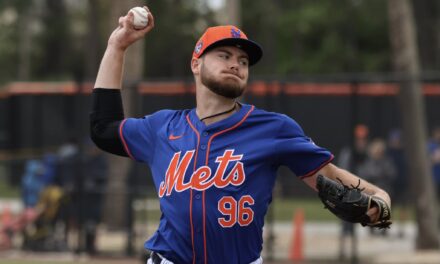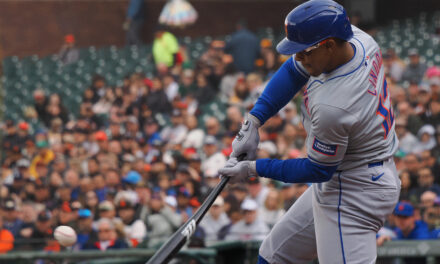There have only been a handful of players in Mets history that can be referred to by first name only. One of these is Darryl. Colorful, exciting and controversial, the life of Darryl Strawberry resembles a Shakespearean Tragedy. He thrived playing major league baseball, battled personal demons, defeated drug and alcohol addiction and encountered legal problems. His fall from grace was monumental. But his life has come full circle.
On May 6, 1983 Tom Seaver took the mound for the Mets against fireballer Mario Soto and the Reds. It should have been billed as a pitching duel but the spotlight that day was on a highly touted prospect named Darryl Strawberry. Never in the history of the Mets had a rookie appeared on the scene with such hype and promise. Signed #1 in 1980, the Mets were planning on building a future around this 18 year-old “kid.” He was hailed as a “cant miss prospect.” Others referred to him as “The Black Ted Williams.” Darryl was already carrying a heavy burden before he ever set foot in Shea. In 122 games that season, he blasted 26 Home Runs, knocked in 74, slugged at 512 and became the first Met to win Rookie of the Year honors since Jon Matlack 11 years earlier.
On a team loaded with offensive weapons, Darryl was the most lethal weapon of all. It was # 18 that opponents feared. At 6’6, Darryl was a tall, lanky figure in the batters box. Even when he struck out, it was exciting. But when he connected, his home runs were majestic. Gifted with a naturally beautiful swing and a high leg kick, Darryl’s home runs were not simple shots that barely cleared the wall. They seemed to lift to the heavens, sailing through the ether and coming down behind the bullpen or reaching the scoreboard. He was the most prolific HR hitter in Mets history.
In Game 7 in 86, it was Darryl who put the final nail in the Red Sox coffin. After Boston scored 2 in the top of the 8th to cut the Mets lead to 6-5, Darryl promptly answered back. He led off the bottom half of the inning going deep against Al Nipper. But Darryl did not circle the bases in normal fashion. He sauntered, shuffling his feet, almost walking around the bases, allowing the Red Sox time to let the magnitude of his blast sink in. The Shea crowd erupted and the smell of a championship filled the air.
From 84-90 Darryl’s star shone brightest. He had the rare combination of power and speed. In 987 games, he went deep 226 times, amassed 659 RBI’s and stole 172 bases. Teammate Ron Darling said, “Darryl could do it all.” The Mets were also controversial and Darryl was in the center of it. In the spring of 87, as the players sat in preparation of their team picture being taken, Darryl got into an altercation with team captain Keith Hernandez over the seating assignments. He also had constant run-ins with Wally Backman, stating once, “I’m going to bust that little redneck in the face.” As most players celebrated the miraculous comeback in Game 6, Darryl was griping to the media. He was upset that Davey Johnson had removed him as part of a double switch and replaced him in the batting order with Kevin Mitchell.
Darryl remains at or near the top of many Mets offensive categories. He is 1st in HR’s (252), Runs (662), RBI’s (733), Walks (580), 2nd in Total Bases (2028), 3rd in Slugging (520), 4th in SB’s (191) and 5th in doubles (187). In 2006, Darryl stated the best day of his life was attending the victory parade in 86. He stated the worst day was leaving the Mets.
As many of the players from those glory days retired or left New York, Darryl also departed. In 1991, he returned to his hometown of Los Angeles where he signed with the Dodgers; 5 years/22 million. His first year in LA was a solid one. He hit 28 HR’s with 99 RBI’s. By the time that season ended, Darryl was just 29 and had already compiled 280 HR’s. However, it would be another 6 years until he would reach 300.
It was during the 90’s where his life went into a tailspin. His on-field heroics were overshadowed by his off-field demons and tragedies.
Within a 4 week period in 1990, Darryl was arrested twice for hitting his wife. In 93, he was arrested again for beating his girlfriend, who was 3 months pregnant at the time. In 94, the Dodgers announced he had a substance abuse problem and he spent 5 weeks in the Betty Ford Center. Later that year, he was indicted for failing to pay taxes and fined close to half a million dollars. In Feb 95, MLB suspended him for 75 days when he tested positive for cocaine. In December, he was arrested for failing to pay child support. In 98, he was sued by attorney Robert Shapiro for unpaid legal fees. In Oct 98, at age 36, he was diagnosed with cancer and had 24 inches of his colon removed. Six months later, while undergoing Chemo Darryl was arrested yet again, this time for solicitation of a prostitute. In Jan 2000, Darryl once again tested positive for cocaine and was suspended from baseball for one full year. In July 2000 it was determined the cancer had returned and Darryl had a kidney removed. Just three months later, he checked himself out of a drug rehab center in Tampa to go on a cocaine binge. He told a judge that he had stopped the chemo and had ‘lost his will’ to live. He also stated, “There is no one to blame for this but myself. I should have bought myself a mirror a long time ago.”
Darryl ended up with 335 career HR’s and 1000 RBI’s. He was a 9 time All-Star and 4 time World Series winner. In 10 post-season series throughout his career, he played for the winning team 8 times.
In spite of the personal turmoil and deep seeded demons within him, his life has come full circle. The “kid” who was predestined to lead the Mets back to respectability in the 80s has become a “man.” In April of this year, shortly after his 47th birthday, he will be releasing his memoirs in a book entitled, “Straw: Finding My Way.” One of his 6 children, DJ, was recently drafted by the Phoenix Suns. In 2006, Darryl got married for the 3rd time. He and his wife Tracy, whom he met while at a drug recovery convention, have founded ‘The Darryl Strawberry Foundation,’ an organization dedicated to helping children with autism. “The bat is retired and the spikes are in a box,” he is quoted as saying, “but the true purpose of my life is just beginning.”














